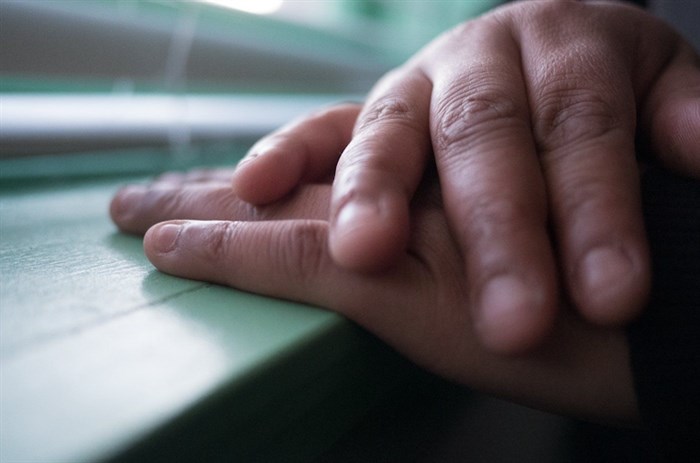
An Indigenous youth who was in care of Robert Riley Saunders when he was working as a social worker in Kelowna says they would like youth to have a chance to tell Saunders how his alleged actions have affected them.
Image Credit: The Discourse/Lauren Kaljur
January 22, 2021 - 6:00 PM
An Indigenous youth who was in care of Robert Riley Saunders when he was working as a social worker in Kelowna says they would like youth to have a chance to tell Saunders how his alleged actions have affected them.
Saunders is alleged to have stolen basic living allowances from more than 100 — mostly Indigenous — youth who were in his care between 1996 and 2018. He’s facing 13 criminal charges, including ten counts of fraud over $5,000, one count of theft over $5,000, one count of breach of trust, and one count of uttering a forged document.
“He certainly deserves anything more than what he’s going to get in jail, but I also think we need some sort form of restorative justice,” says ‘Alex’ — whose real name we are withholding due to a court-ordered publication ban prohibiting the sharing of information that could identify victims, including their gender.
Alex says they would like youth who were in Saunders’ “care” to have the opportunity “to come and talk with him or write to him, or somehow get their message across to [him] about how he’s affected them.”
Saunders was released on bail on Dec. 18 by B.C. Provincial Court judge Monica McParland.
His trial is set to resume at the B.C. Provincial Courts in Kelowna on Monday, Jan. 25, but Saunders won’t be appearing in person, according to an email from a B.C. Prosecution Service spokesperson. Instead, he’ll be represented by his lawyer.
Self-care during the trial
As the trial unfolds, Alex says self-care will be “quite difficult.”
“I have PTSD, so I have days where I can’t manage and my [partner] has to do a lot of the work,” they say. “And then there are days where, you know, I’m feeling better and I do the work.”
“I have lots of therapy ahead of me,” they add. “It’s hard when you have a young child and you have to explain to them what intergenerational trauma is.”
Asked what message they have for other youth who were in Saunders’ care, Alex says, “Always remember that you’re a warrior and that nothing can take that away from you.”
“I’m really proud of those people who have come forward and those who couldn’t, I’m proud of as well.
“I’m proud of all the people who help us protest this man and help us take him down, but I need people to continue fighting,” they say. “This is not just one corrupt person, in my opinion. This is a group of corrupt people we’re up against, and we’re up against systematic racism.”
Need to ‘indigenize our systems’
Beyond a restorative justice process, Alex wants a total overhaul of the child welfare system.
For example, they would like to see it become mandatory for social workers with B.C.’s Ministry of Children and Family Development (MCFD) to register with the B.C. College of Social Workers (BCCSW).
Saunders allegedly faked his credentials on his résumé in order to get hired by MCFD as a social worker, according to documents disclosed in a separate legal matter, which was settled in 2020.
In B.C., social workers employed by MCFD may voluntarily register, but “mandatory registration is only required of those social workers employed by BC’s health authorities,” says Michael Crawford, president of the B.C. Association of Social Workers.
Crawford says he’s been pushing MCFD to make registration mandatory for all B.C. social workers, as he believes it will “improve services to children, youth, and families.”
“The BCCSW has a code of ethics, standards of practice, a duty to report, and a scope of practice statement,” he wrote in an email. “Additionally, the BCCSW has the authority to receive and investigate complaints, and it has the authority to discipline registrants.”
For Alex, mandatory registration represents the tip of the iceberg.
“I would like to see [social workers] have to have more credentials than they currently do and to be registered — that would be awesome,” says Alex. “But if we could abolish the system entirely, that would even be better.
“These systems, no matter how much we change them, are still designed against specifically Indigenous people because they’re designed to take our children.
“I would like to indigenize our systems, and I don’t mean delegating Aboriginal agencies for child protection … I mean truly indigenizing communities, like, in our traditional knowledge,” they say.
“Uproot the systems that keep us oppressed and create an entirely new one, because clearly the one we have, no matter how we change it, it’s still not working for us.”
The Saunders case should be “thoroughly examined” by Indigenous leadership, Alex says.
“I don’t mean, like, governmental departments. What I mean is departments like the missing and murdered Indigenous women department where they can approach it from a culturally appropriate and meaningful way,” they say.
“I think that our traditional governing systems need to be put in place to help with this process.”
News from © iNFOnews, 2021